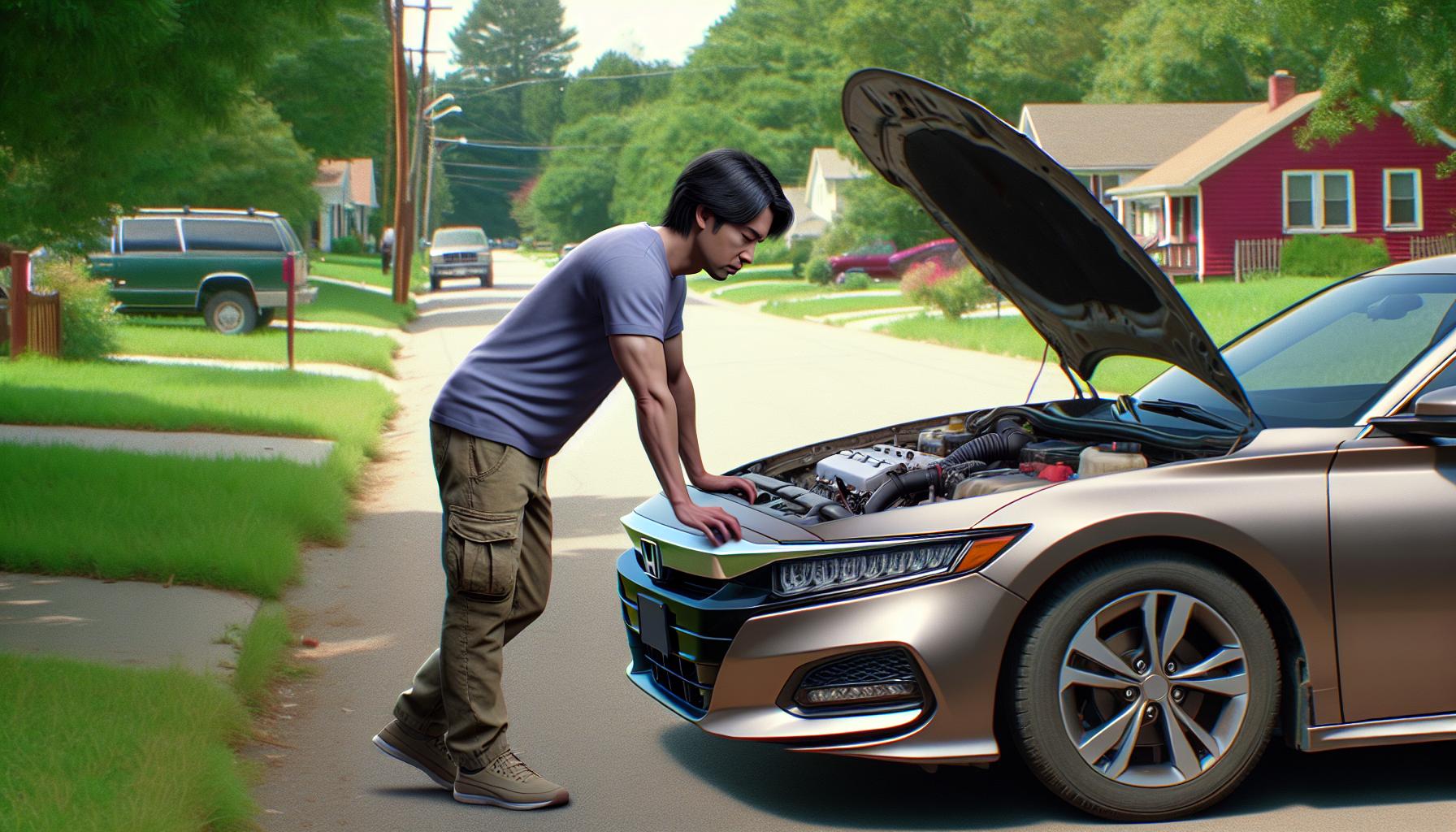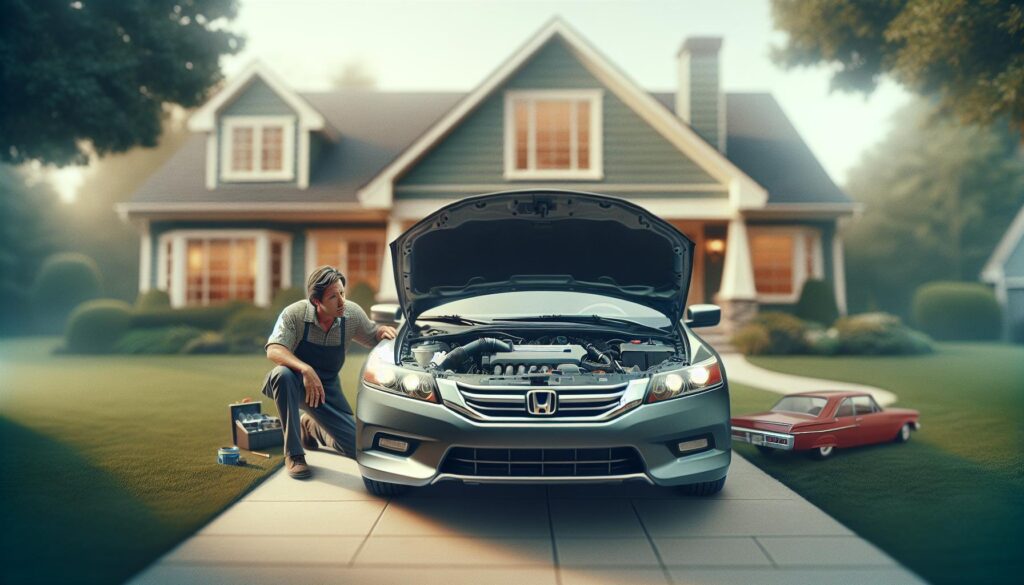Experiencing a jolt or jerk when accelerating in a Honda Accord can be both frustrating and concerning. This issue often signals underlying problems that could affect the vehicle’s performance and safety. Understanding the potential causes can help drivers address the situation promptly and avoid further complications.
Several factors might contribute to this jerking sensation, from transmission issues to fuel delivery problems. Identifying the root cause is essential for effective repairs and maintaining the vehicle’s reliability. Whether it’s a simple fix or requires professional attention, knowing what to look for can save time and money in the long run.
Why Does my Honda Accord Jerk When i Accelerate
Jerking during acceleration in a Honda Accord can stem from several mechanical issues. Understanding these causes can help in diagnosing and fixing the problem effectively.
Transmission Issues
Transmission problems often contribute to jerking sensations. Issues may include low transmission fluid levels, which can lead to poor lubrication and erratic shifting. Worn or damaged transmission bands can cause slipping, resulting in sudden jerks as the vehicle accelerates. Additionally, failing sensors, such as the throttle position sensor or transmission control module, can misinterpret data, triggering uneven acceleration. Regular maintenance and timely inspections are essential to prevent these issues.
Engine Problems
Engine-related issues can also cause jerking during acceleration. A clogged fuel filter restricts fuel flow, leading to inconsistent engine performance. Similarly, faulty spark plugs may fail to ignite fuel efficiently, causing hesitation or jerking. Vacuum leaks in the intake system disrupt the air-fuel mixture, adversely affecting engine operation. Diagnosing these problems early can enhance vehicle performance and prevent further complications.
Symptoms of Jerking While Accelerating

Experiencing jerking while accelerating can manifest through various symptoms. Recognizing these signs assists in identifying potential issues early.
Vibration and Noise
Vibration may occur when an Accord accelerates inconsistently. Owners might notice unusual rattling or grinding noises, which often accompany the jerking sensation. These symptoms can signify problems with the engine mounts, worn out components in the drivetrain, or transmission issues. Addressing vibrations promptly prevents further damage and ensures a safer driving experience.
Warning Lights
Warning lights on the dashboard can indicate underlying problems related to jerking while accelerating. The check engine light, for instance, often activates due to issues like misfires or transmission malfunctions. Other lights, such as those for the stability control system or fuel system, may illuminate if there’s a significant problem affecting acceleration. Monitoring these warning lights helps drivers respond proactively to potential issues.
How to Diagnose the Issue
Diagnosing acceleration jerks in a Honda Accord involves systematic evaluation. Following these steps may help pinpoint the underlying issue effectively.
DIY Troubleshooting Steps
- Check Transmission Fluid Levels: Low fluid can cause jerking during acceleration. Ensure the fluid is at the recommended level and replace it if it’s dirty or burnt.
- Inspect Spark Plugs: Worn or faulty spark plugs disrupt engine performance. Remove and examine them for wear, replacing any that are damaged.
- Examine Fuel Filters: Clogged fuel filters limit fuel flow, causing acceleration issues. Replace filters that appear dirty or haven’t been changed in a while.
- Look for Vacuum Leaks: Cracks in vacuum hoses can lead to erratic engine performance. Inspect hoses for signs of wear or damage, and replace as necessary.
- Test Engine Mounts: Worn engine mounts can cause vibrations and jerking. Look for excessive movement of the engine during acceleration.
- Monitor Engine Behavior: Pay attention to any unusual noises, vibrations, or warning lights while driving. These can provide additional clues regarding potential issues.
- Persistent Warning Lights: If the check engine light stays on after initial troubleshooting, a diagnostic scan by a professional is necessary.
- Transmission Issues: If experiencing consistent jerking tied to gear shifting, seek help from a qualified technician for inspections and repairs.
- Significant Performance Changes: If performance drastically worsens or additional symptoms arise, contact a professional. These changes may indicate serious engine or transmission problems.
- Safety Concerns: If the jerking affects handling or control, immediate professional evaluation is crucial to ensure safety while driving.
Preventive Measures to Avoid Jerking
Taking proactive steps can help prevent jerking when accelerating in a Honda Accord. Implementing regular maintenance and adopting good driving habits significantly enhances vehicle performance.
Regular Maintenance
Regular maintenance ensures that all vehicle components function correctly, which helps prevent jerking during acceleration. Key maintenance tasks include:
- Checking Transmission Fluid: Low fluid levels can cause transmission issues, leading to erratic shifts. Inspect fluid levels monthly and replace fluid as recommended in the owner’s manual.
- Replacing Spark Plugs: Worn or faulty spark plugs can cause misfires and jerking. Replace spark plugs every 30,000 to 100,000 miles, depending on the type used.
- Maintaining Fuel Filters: Clogged fuel filters restrict fuel flow, resulting in performance issues. Replace fuel filters according to the manufacturer’s schedule, typically every 15,000 to 30,000 miles.
- Inspecting Vacuum Lines: Cracked or loose vacuum lines can result in air leaks, affecting engine performance. Examine these lines regularly and replace damaged sections promptly.
- Testing Engine Mounts: Worn engine mounts can lead to excessive movement, causing jerking sensations. Inspect engine mounts for wear every 60,000 miles.
Driving Habits
Driving habits directly influence vehicle performance. By adopting better practices, drivers can minimize acceleration jerking. Important habits include:
- Accelerating Smoothly: Gradual acceleration reduces stress on the transmission. Avoid rapid starts to maintain smoother engine operations.
- Maintaining Consistent Speed: Keeping a constant speed minimizes strain on the drivetrain. Use cruise control on highways whenever possible to achieve this.
- Avoiding Overloading: Excess weight can strain the engine and transmission. Adhere to the vehicle’s weight limits to optimize performance.
- Anticipating Stops and Starts: Being aware of traffic conditions allows drivers to anticipate when to slow down or accelerate, reducing the frequency of abrupt movements.
- Regularly Driving the Vehicle: Infrequent use can lead to various mechanical issues. Regular driving helps keep components lubricated and functioning properly.
Addressing the jerking sensation during acceleration in a Honda Accord is essential for maintaining optimal performance and safety. By understanding the potential causes and symptoms drivers can take proactive steps to diagnose and resolve issues before they escalate. Regular maintenance and attention to warning signs play a crucial role in preventing further complications.
Adopting good driving habits can also contribute to a smoother ride. Ultimately staying informed and vigilant ensures a reliable and enjoyable driving experience.
